In the ever-evolving digital landscape, businesses constantly seek innovative solutions to streamline operations, enhance customer experiences, and maximize returns on investment. Among the groundbreaking technologies reshaping the marketing world is AI marketing automation. This dynamic fusion of artificial intelligence (AI) and marketing automation is revolutionizing how businesses connect with their audiences, manage campaigns, and drive growth.
This article provides an in-depth exploration of AI marketing automation, including its benefits, tools, applications, challenges, and future potential.Businesses can gain a competitive edge and unleash the potential of this game-changing technology by comprehending its capabilities.
What is AI Marketing Automation?
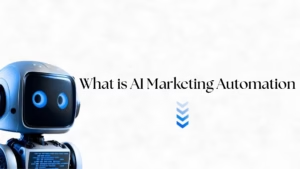
AI Marketing Automation refers to the integration of artificial intelligence (AI) with marketing automation platforms to enhance marketing efforts through intelligent, data-driven decision-making. Unlike traditional marketing automation, which follows pre-set rules and workflows, AI marketing automation learns from real-time data and adapts to deliver personalized, optimized experiences for customers at scale.
1. AI Integration with Marketing Automation: AI marketing automation integrates automated marketing solutions with machine learning, natural language processing (NLP), and predictive analytics. This combination allows businesses to streamline and personalize marketing tasks with greater accuracy and efficiency.
2. Data-Driven Decision Making: AI-powered tools analyze vast amounts of customer data to identify patterns and trends. AI systems can offer more profound insights and direct marketing strategies for improved outcomes by learning from consumer behavior and preferences.
3. Personalization at Scale: One of the key strengths of AI marketing automation is its ability to create hyper-personalized customer experiences. Based on each customer’s unique profile, AI may provide personalized content, product recommendations, and communication tactics.
4. Constant Learning and Adaptation: AI systems are always learning from fresh data, in contrast to classical automation. This means AI marketing automation becomes more effective over time, improving targeting and engagement by adapting to shifting customer needs.
5. Scalability and Efficiency: AI marketing automation manages social media, audience segmentation, and email scheduling, among other repetitive duties. In addition to saving time, this allows marketing campaigns to be scaled across big audiences without compromising quality.
6. Real-Time Optimization: AI marketing automation makes it possible to analyze and modify campaigns in real time. AI systems can optimize campaigns instantly based on performance data, improving return on investment (ROI) and maximizing engagement.
Key Benefits of AI Marketing Automation
 The adoption of AI marketing automation offers numerous advantages for businesses of all sizes. Below are some of its key benefits:
The adoption of AI marketing automation offers numerous advantages for businesses of all sizes. Below are some of its key benefits:
1. Enhanced Efficiency
Automating repetitive tasks such as email scheduling, audience segmentation, and social media posting frees up marketers to focus on strategic initiatives.Time-consuming tasks are handled by AI-powered solutions, which guarantee precision and consistency.
2. Hyper-Personalization
AI provides each user with a personalized experience by analyzing enormous volumes of data. From tailored product recommendations to dynamic email content, businesses can create messages that resonate with individual preferences and behaviors.
3. Data-Driven Insights
Processing massive datasets to find patterns, trends, and useful insights is where AI marketing automation shines. This helps marketers make well-informed choices and improve campaign performance.
4. Cost Savings
By automating manual processes, businesses can reduce labor costs while improving the efficiency of their campaigns. Additionally, AI tools maximize advertising expenditures, guaranteeing that funds are distributed efficiently.
5. Scalability
As companies expand, handling increasing amounts of data and client interactions may become too much to handle. AI marketing automation scales seamlessly, allowing businesses to maintain high levels of service without additional resources.
6. Real-Time Optimization
Campaigns are continuously monitored and modified by AI systems using real-time performance data. This dynamic approach ensures maximum return on investment by reallocating budgets, refining targeting, or tweaking ad creatives as needed.
7. Improved Customer Experience
AI-driven solutions like chatbots, personalized content, and predictive analytics enhance the customer journey. These tools anticipate needs, resolve queries promptly, and offer relevant solutions, fostering stronger brand loyalty.
Core Components of AI Marketing Automation
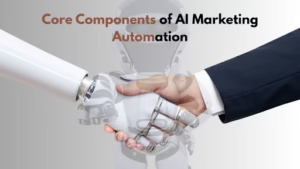
To understand the mechanics of AI marketing automation, it’s essential to explore its foundational elements.Together, these elements provide a smooth marketing experience:
1. Customer Data Platforms (CDPs)
To build unified profiles, Customer Data Platforms (CDPs) gather and organize customer information from a variety of sources. Accurate targeting and personalization are made possible by this unified picture.
2. Predictive Analytics
AI predicts future consumer behavior by utilizing both previous and current data. Marketers can use these predictions to anticipate trends, identify potential leads, and optimize engagement strategies.
3. AI-Powered Chatbots
Chatbots equipped with natural language processing (NLP) provide instant customer support, guide users through the sales funnel, and handle routine queries.They are open around-the-clock to guarantee that clients get help quickly.
4. Automated Content Personalization
AI tools dynamically generate personalized content, such as email copy, social media posts, and website recommendations, tailored to individual preferences.
5. Dynamic Ad Targeting
AI adjusts ad placements, bidding strategies, and creatives based on user behavior and campaign performance, maximizing engagement and conversions.
6. Machine Learning Algorithms
Systems can adjust and get better over time thanks to machine learning, which allows them to refine marketing plans based on continuous data analysis.
Applications of AI Marketing Automation

AI marketing automation has diverse applications, making it a valuable asset for businesses in various industries.Some of the most important applications are as follows:
1. Email Marketing
AI enhances email marketing by personalizing subject lines, optimizing delivery times, and tailoring content to individual recipients.It guarantees increased conversions, click-through rates, and open rates.
2. Social Media Management
AI-powered tools automate social media posting, monitor audience engagement, and curate content based on user preferences. Platforms like Hootsuite and Buffer use AI to suggest the best times to post and analyze campaign performance.
3. Lead Scoring and Nurturing
AI assesses leads according to their engagement, behavior, and conversion rate. This helps marketers prioritize high-value prospects and deliver targeted messaging throughout the sales funnel.
4. Content Recommendations
AI analyzes user behavior to suggest relevant blog posts, videos, or products. Platforms like Amazon and Netflix excel at this, driving user engagement and repeat business.
5. Customer Support
AI chatbots answer consumer questions in real time, increasing customer satisfaction and cutting down on support expenses. They can respond to frequently asked queries, assist users, and, if required, refer complicated problems to human agents.
6. Ad Campaign Optimization
AI regularly assesses the effectiveness of ads and modifies them to increase return on investment. It refines targeting parameters, adjusts budgets, and tweaks ad creatives for optimal results.
Popular Tools and Platforms

The integration of artificial intelligence into marketing automation has led to the development of a range of tools and platforms that simplify and enhance various aspects of digital marketing. From email campaigns to customer relationship management (CRM), AI-powered solutions are revolutionizing how businesses engage with their audiences. Here are some of the most popular tools and platforms that are helping businesses leverage AI marketing automation:
1. HubSpot
HubSpot is one of the leading platforms for inbound marketing and sales automation, offering AI-driven tools for email marketing, lead nurturing, and customer relationship management (CRM). With its easy-to-use interface and powerful automation capabilities, HubSpot helps businesses streamline marketing efforts. Its AI-powered tools enable personalized email campaigns, predictive lead scoring, and efficient social media scheduling, all aimed at increasing engagement and improving conversion rates.
2. Marketo Engage (by Adobe)
Marketo Engage is an AI-powered marketing automation platform designed for businesses looking to optimize their customer journey from lead generation to conversion. It provides powerful tools for email marketing, lead management, and predictive analytics. Marketo’s AI features allow for audience segmentation, behavior-based targeting, and campaign optimization, ensuring marketers can create tailored campaigns that resonate with their audiences and drive meaningful interactions.
3. Salesforce Einstein
An AI technology called Salesforce Einstein easily connects to the Salesforce CRM. It provides predictive insights, automated lead scoring, and personalized customer interactions. Einstein uses machine learning algorithms to analyze data and predict future customer behavior, allowing marketers to craft highly targeted campaigns and optimize the sales process. It also enables real-time analytics to track campaign performance, making it a valuable tool for driving smarter decision-making.
4. ActiveCampaign
ActiveCampaign is a marketing automation platform that combines AI with a robust email marketing system, offering an intuitive way to manage customer journeys and sales pipelines. The platform’s AI features include personalized email content, predictive email send times, and dynamic content recommendations. ActiveCampaign’s machine learning algorithms ensure that businesses can send timely and relevant messages to their audiences, increasing the likelihood of conversions and improving customer engagement.
5. Drift
Drift is a conversational marketing tool that engages website visitors in real time with chatbots driven by artificial intelligence. It allows businesses to qualify leads, answer customer questions, and guide prospects through the sales funnel 24/7. Drift’s AI-driven chatbots use natural language processing (NLP) to understand customer queries and provide relevant responses, helping to drive higher conversion rates and deliver a seamless customer experience.
6. Klaviyo
Klaviyo is an AI-driven email marketing and automation platform specifically tailored for eCommerce businesses. It leverages advanced data analytics to help online retailers create highly personalized and effective email campaigns that drive customer engagement and sales. It leverages data from customer behaviors and transactions to create highly personalized and effective marketing campaigns. Klaviyo’s AI tools allow marketers to automate email flows, create predictive product recommendations, and segment audiences based on their preferences and purchase history, helping businesses enhance customer retention and boost sales.
7. Zoho MarketingHub
Zoho MarketingHub is an all-in-one marketing automation platform that offers AI-powered tools for email marketing, lead management, and analytics. The platform’s AI features enable businesses to create targeted campaigns by analyzing customer behavior and predicting the best times to reach out. Zoho’s automation tools simplify workflows, allowing marketers to focus on creating compelling content and strategies that drive growth.
8. Pardot (by Salesforce)
Pardot is another AI-powered marketing automation platform offered by Salesforce, designed for B2B marketers.By combining AI with CRM features, it optimizes lead scoring, lead nurturing, and email marketing. Pardot’s AI-driven features enable predictive analytics, automated campaign optimization, and personalized content delivery, helping businesses engage prospects and convert leads into loyal customers.
9. SendGrid
SendGrid, primarily known for its email marketing automation, uses AI to optimize email deliverability, create personalized content, and track engagement. The platform’s AI tools analyze customer interactions and behavior, ensuring that businesses can send targeted, data-driven email campaigns that resonate with individual recipients. With advanced reporting and A/B testing capabilities, SendGrid allows businesses to fine-tune their email marketing strategies for maximum effectiveness.
Challenges and Limitations
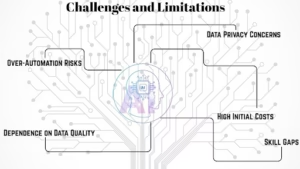
Even with its benefits, AI marketing automation has drawbacks. To guarantee successful implementation, businesses need to overcome certain obstacles:
1. Data Privacy Concerns
Due to their heavy reliance on consumer data, AI systems raise questions regarding data security and adherence to laws like the CCPA and GDPR. Transparency and moral conduct are necessary to keep the trust of clients.
2. High Initial Costs
Putting AI marketing automation into practice may involve a large infrastructure, technology, and training investment. This may pose a barrier for smaller businesses with limited budgets.
3. Skill Gaps
Many marketers lack the technical know-how required to fully utilize AI technologies. Businesses must invest in training or hire specialists to bridge this gap.
4. Dependence on Data Quality
The caliber of the data that AI systems process determines how effective they are.Inaccurate insights, faulty predictions, and subpar performance might result from low-quality data.
5. Over-Automation Risks
Excessive reliance on automation can result in a loss of the human touch, making interactions feel impersonal.Achieving equilibrium between automation and human interaction is essential.
Best Practices for Implementing AI Marketing Automation

Implementing AI marketing automation successfully requires a strategic approach that maximizes the technology’s potential while addressing its challenges. To unlock the full capabilities of AI in your marketing efforts, businesses must follow best practices that ensure smooth integration, efficiency, and measurable results. Below are some key practices to guide businesses through the AI marketing automation journey.
1. Define Clear Objectives: Prior to implementing AI marketing automation, it is essential to establish clear objectives. Determine what you want to achieve—whether it’s increasing customer engagement, boosting conversions, improving lead nurturing, or enhancing customer retention. Setting clear, measurable objectives will help you evaluate the performance of your AI initiatives and adjust strategies accordingly.
2. Invest in Reliable Tools: Not all AI marketing platforms are created equal. Businesses must choose tools that align with their unique needs and offer robust support. Look for platforms that integrate well with existing systems, such as Customer Relationship Management (CRM) or Customer Data Platforms (CDPs), to ensure seamless data flow. Choose scalable solutions that will expand with your company.
3. Ensure Data Quality and Accuracy: The caliber of the data that AI crunches determines how effective the technology is. Clean, accurate, and up-to-date data is essential for AI systems to make informed decisions. Regularly audit your data sources, eliminate duplicates, and ensure that data is stored correctly. In addition to increasing campaign effectiveness, high-quality data guarantees accurate AI predictions and insights.
4. Start with Small-Scale Tests: Start by using AI marketing automation to a particular region or campaign in order to reduce risks and optimize learnings. Running small-scale tests allows you to analyze the effectiveness of AI tools in real-world conditions and make adjustments before scaling up. Whether it’s testing email marketing automation or social media post scheduling, incremental implementation helps refine strategies without overwhelming resources.
5. Blend AI with Human Creativity: AI can automate processes and analyze data, but it cannot take the place of human sensitivity and creativity. Leverage AI to optimize decision-making, personalize content, and track performance, but combine it with human insights for strategy development. Maintain a balance where AI amplifies marketing efforts without losing the human touch in customer interactions.
6. Focus on Customer-Centricity: Personalization is at the core of AI marketing automation. Ensure that your AI tools prioritize delivering tailored experiences based on individual customer data. AI can suggest pertinent goods or information by examining consumer preferences, purchasing patterns, and interactions. Always remember that the ultimate goal is to enhance the customer journey and build long-lasting relationships.
7. Monitor and Continuously Optimize: AI marketing automation is not a “set it and forget it” strategy.Monitor important performance indicators on a regular basis to assess how well your AI-powered campaigns are working. Use the insights gained to tweak strategies, improve targeting, and adjust budgets. AI systems should be continuously refined to align with ever-changing customer preferences, market trends, and business objectives.
Future Trends in AI Marketing Automation
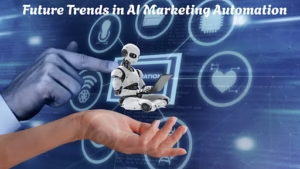
AI marketing automation is developing quickly, and even more innovation is anticipated in the future.As technology advances, here are some key trends shaping the future of AI-driven marketing automation:
1. Hyper-Personalization
AI will deliver deeper levels of personalization by analyzing real-time data to understand customer preferences, behaviors, and intent. This will enable brands to create ultra-targeted campaigns that resonate with individuals, fostering stronger customer loyalty and higher conversion rates.
2. Voice Search Optimization
With the growing popularity of voice assistants like Alexa, Siri, and Google Assistant, AI will play a pivotal role in optimizing marketing content for voice searches. Businesses will need to create conversational, question-based content to capture voice search traffic.
3. Predictive Customer Journeys
AI will map out entire customer journeys, predicting user actions and optimizing touchpoints along the way. This proactive approach will guide users seamlessly from awareness to conversion, enhancing the overall experience.
4. Integration with IoT
The Internet of Things (IoT) is expanding rapidly, and AI marketing automation will integrate with connected devices like smart home systems, wearables, and automobiles. This will open up new avenues for engaging customers in real-time and contextual ways.
5. Ethical AI Practices
As AI adoption grows, there will be an increased focus on ethical data usage and transparent algorithms. Businesses will need to prioritize compliance with privacy regulations while fostering trust through responsible AI practices.
These trends highlight the transformative potential of AI marketing automation, enabling businesses to stay competitive, connect with their audiences in innovative ways, and achieve unprecedented efficiency in their campaigns. The future is undoubtedly bright for those willing to embrace AI-powered marketing.
Conclusion
AI marketing automation is transforming the marketing landscape, enabling businesses to operate more efficiently, connect with audiences on a deeper level, and achieve remarkable results.AI frees up marketers to concentrate on strategy and creativity by automating repetitive operations, creating tailored experiences, and offering actionable insights.
While challenges such as data privacy and implementation costs persist, the benefits far outweigh the drawbacks.Companies who use AI marketing automation now will be in a strong position to prosperwithin an increasingly competitive digital environment.
AI marketing automation will keep developing as technology progresses, opening up new avenues and changing the marketing landscape. For businesses ready to innovate and grow, the time to adopt AI marketing automation is now.
For more digital marketing services, visit the site
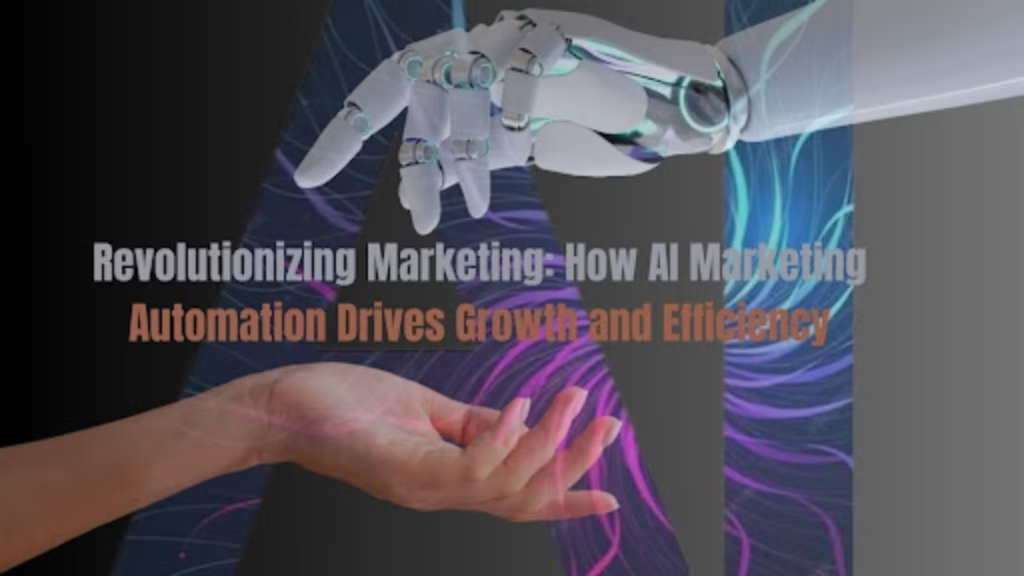
Helo savad How are you
fine bro
Your blog is a true hidden gem on the internet. Your thoughtful analysis and in-depth commentary set you apart from the crowd. Keep up the excellent work!
thank you for your feedback.
thanks my friend